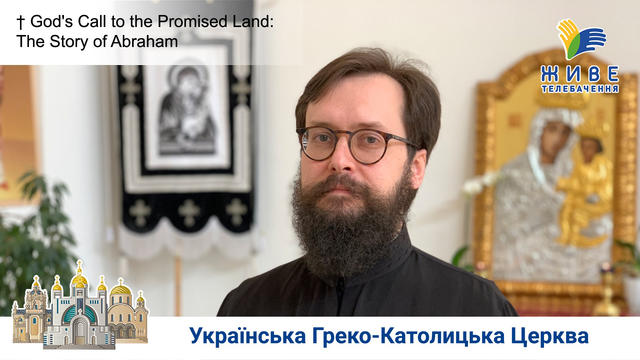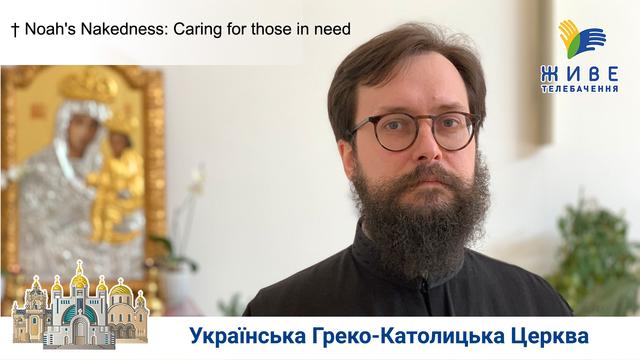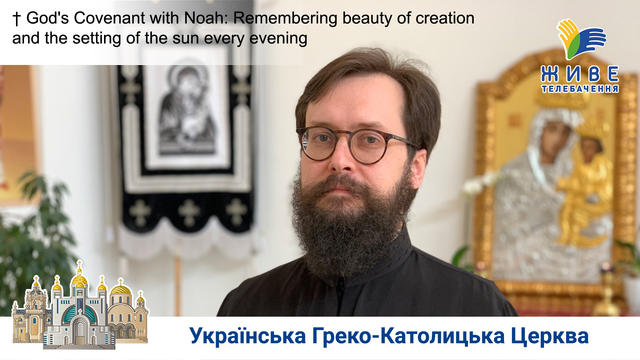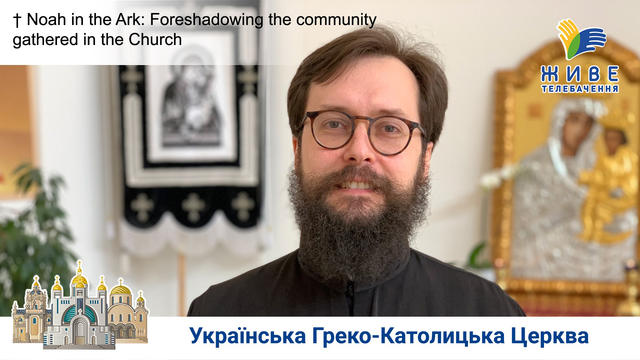Day 4: Who needs God? Great Lent Retreat Online
Day 4: Thursday, 26 March 2020
Who needs God?
Yesterday we heard about Noah and his sons after the flood, and how one of his sons mocked and neglected him when he was weak and naked, while his other two sons cared for him and restored his dignity. We learned that we must take the example of Shem and Japheth, the two sons who covered Noah’s nakedness, and at times leave our own comfort zone and cover our parents and grandparents, the elderly, and those in need with our love, bringing them into our hearts. Today, in the next reading from the Book of Genesis for the fourth Thursday of Great Lent, we hear about what happens to the human race after Noah, once his descendants became fruitful and multiplied and filled the earth. In Genesis 10:32–11:9 we read:
These are the families of the sons of Noah, according to their genealogies, in their nations; and from these the nations spread abroad on the earth after the flood. [1] Now the whole earth had one language and few words. [2] And as men migrated from the east, they found a plain in the land of Shinar and settled there. [3] And they said to one another, «Come, let us make bricks, and burn them thoroughly.» And they had brick for stone, and bitumen for mortar. [4] Then they said, «Come, let us build ourselves a city, and a tower with its top in the heavens, and let us make a name for ourselves, lest we be scattered abroad upon the face of the whole earth.» [5] And the LORD came down to see the city and the tower, which the sons of men had built. [6] And the LORD said, «Behold, they are one people, and they have all one language; and this is only the beginning of what they will do; and nothing that they propose to do will now be impossible for them. [7] Come, let us go down, and there confuse their language, that they may not understand one another’s speech.» [8] So the LORD scattered them abroad from there over the face of all the earth, and they left off building the city. [9] Therefore its name was called Ba’bel, because there the LORD confused the language of all the earth; and from there the LORD scattered them abroad over the face of all the earth.
If we take the text at face value, it looks as if God is annoyed by human progress, is vengeful and jealous, and destroys our good work for nothing, just so that we cannot be close to Him. But is this really what the text of the Holy Scriptures here is saying? Let us take a closer look.
St. John Chrysostom points out that the men who built Babel did not know how to be satisfied with what they had, being greedy and selfish. He writes:
«Instead of managing to keep to their own boundaries, they always long for more and reach out for greater things. This is what the human race has lost in particular, not being prepared to recognize the limitations of its own condition but always lusting after more, entertaining ambitions beyond its capacity. In this regard, too, when people who chase after the things of the world acquire for themselves much wealth and status, they lose sight of their own nature, as it were, and aspire to such heights that they topple into the very depths. You could see this happening every day without others being any the wiser from the sight of it. Instead, they pause for a while but immediately lose all recollection of it and take the same road as the others and fall over the same precipice» (St. John Chrysostom, Homilies on Genesis 30.5).
Thus, the problem here with the men who built the tower of Babel was not the wish to grow and improve, but the motivation and the failure to know when to stop. Their goal is not to be closer to God, but to build a city for themselves, with its heights in the heavens, to make a name for themselves.
One of the Psalms that we read at Vespers this evening, Psalm 126, reminds us that we must be co-operators with God, inviting God into our lives and every action thereof. The psalm states that:
Except the Lord build the house, in vain do they labour that build it.
Except the Lord guard the city, in vain does he watch that guards her; it is vain for you to rise at dawn… (Psalm 126:1–2)
Jesus explains that when building our house, it is not enough the invite the Lord in and be co-operators with God. We must have God’s Word — the Rock of Faith — as our foundation:
«Every one then who hears these words of mine and does them will be like a wise man who built his house upon the rock; [25] and the rain fell, and the floods came, and the winds blew and beat upon that house, but it did not fall, because it had been founded on the rock. [26] And every one who hears these words of mine and does not do them will be like a foolish man who built his house upon the sand; [27] and the rain fell, and the floods came, and the winds blew and beat against that house, and it fell; and great was the fall of it.» (Matthew 7:24–27)
This is certainly the case not only for building houses or towers, but also for building all our relationships in life, with our co-workers, our friends, and especially in our marriages and families.
But, we might argue, why did God break apart and destroy the unity that existed among the men of Babel? Why divide their tongues and not simply work to fix it? Certainly. In life, we are often forced take the attitude of «it is what it is» and work with what we have. This is certainly one approach. But God had a different plan. He decided to scatter the nations and divide the languages until such time as He could show us what true service and unity is. Only after He sent us His Son, Who Himself showed us what true service was, for example, in washing the feet of His disciples, in being humble, and in offering His own life on the Cross for the life of the world as the greatest sign of love — only then could He unite the nations and the tongues. And He did so by sending us His Holy Spirit. We sing about this on Pentecost, in the Kontakion of the Feast:
When the Most High came down and confused the tongues, He parted the nations. When He divided the tongues of fire, He called all to unity; and with one voice we glorify the all-Holy Spirit. (Kontakion of Pentecost, Tone 8)
Acknowledging our pride and sinfulness, let us look at our situation today. Pope John Paul II warned us about the culture of death, «the eclipse of the sense of God and of man [which] inevitably leads to a practical materialism, which breeds individualism, utilitarianism and hedonism» (Evangelium Vitae, 1995). Some commentators have made the following observations about our world today and the incredible pace with which we attempt to work, travel, and achieve progress. Our false sense of control has been stripped from us and we are laid bare, because we are hardwired to «do something» at all times, to keep busy, especially now, in response to suffering, loss, attacks, and threats to our community. Yet now, in the greatest disruption to global life since the Second World War, according to some estimates, the very thing we are called to do is — nothing. Our mobilization is the mobilization of isolation. To do something now is to stay home, not go to work, school, parties, sporting events, concerts, or — most sadly for many of us — to go to church and receive the Eucharist. (cf. Helen Freeh, «Doing Nothing is Doing Something,» The Catholic Thing).
We are locked in our homes, in our rooms, in our cells. It is almost as if we have all been tonsured overnight as cloistered monks and nuns, and thrown into our own cells, but without any kind of novitiate or preparation.
Mother Gabriela, a nun of Christ the Bridegroom Monastery in Ohio, has commented about this situation of seclusion and how we need to approach it. She writes: «I believe this is precisely the purification that we need — as a culture and Church in America. We need to know Who we receive in the Eucharist. We need to know that He is God, and we are not. We need to fast from our need to control — to have things „on demand’ — even sacraments. We need to allow this purification to drive us inward in the right way — to the presence of God in each of us. To learn to pray. To seek relationship with the Trinity. We need to learn to pray as a family, to make God’s love present in our homes.» (Mother Gabriela, «An open letter to the faithful: A Eucharistic „fast“,» Christ the Bridegroom Monastery).
Let us ask ourselves: have I been going to Communion or attending services out of habit, without really being aware of what I am doing and what goes on during the Divine Liturgy?
Archimandrite Sophrony Sakharov reminds us: «Deep prayer comes gradually. Body and soul adapt slowly. It is particularly important for the priest who celebrates the Divine Liturgy to transmute his entire life into prayer if he would live this great sacrament to the full. Preparing himself in awe, and approaching with reverence, by the very content of his office, the priest is drawn into the domain of the Divine. He begins the Liturgy by invoking the dread Name of the Holy Trinity, and continues in spirit poised between the Creator and all created being.» (Sophrony Sakharov, His Life is Mine, 87)
Do we, clergy, approach the Altar of God every time with this awareness of what we are doing? Do we place the Mysteries upon the altar we build for God in our hearts? Are we fully open to receive God’s grace and love, and to share it with the outside world, with our neighbour, and even our enemies?
Is our worship of God real worship, or routine, cultic worship focused only on the mechanics of how many times we should cross ourselves, which way we should turn, where we should put which candle, what colour of vestments we should or should not wear? Or do we understand that all these things are expressions of our love of God that are good, but they are just a start, since they must bring us and our neighbour closer to God — rather than lead us into pride, like Pharisees or the men who built the tower of Babel.
Fr. Alexander Schmemann lamented the Church’s impoverished self-understanding as a «cultic society,» existing «only for the sake of the cult.» He bemoaned the Church’s inability to understand that the purpose of liturgy is to place the «Church before the face of the world.» He suggests that the Church must show «the love of God directed toward the world,» and, rather than feeding our obsession with the cult and a desire to depart from the world, we must sincerely and profoundly offer the world to God during every liturgy, where we pray for all men and women and for peace throughout the world. (Cf. Nicholas Denysenko, «Eucharistic Living without the Eucharist,» Praytell Blog)
Let us remember what the priest says during the Anaphora immediately before the Epiclesis, that is, the invocation of the Holy Spirit to descend: «Further, we offer to You this rational and unbloody worshipʼ» — the worship of God that St. Paul talks about in Romans 12:1; and the priest continues — «and we ask, we pray, and we entreat You: Send down Your Holy Spirit upon us and upon these Gifts here present.»
Fr. Robert F. Taft, SJ, explains what this means: «…the purpose of the Eucharist is not [only] to change bread and wine, but to change you and me. Through baptism and Eucharist it is we who are to become Christ for one another, and a sign to the world that is yet to hear his name. That is what Christian liturgy is all about because that is what Christianity is all about.»
Thus, when we are tempted to think that our prayer is idle or a waste of time, or we hear voices taunting us to «get back to work!» in these days of isolation, remember the examples we have heard so far from the Scriptures: Noah’s immediate response after being saved was not to begin working, but to build an altar to God and offer a sacrifice. When Israel was saved from Egypt and God drowned the pursuing armies of Pharaoh in the Red Sea, Moses and the Israelites did not immediately say: «Alright, now let’s get out of here and make our way to that Promised Land God mentioned.» No, they sang a song of victory and thanksgiving to God. From the perspective of the world today, the world that often goes the way of the men building the tower of Babel, these can be seen as the most useless things. But let us in these days see our time and our prayer and our work in a different light, in the light of Christ that illumines all. Let us approach the Divine Mysteries of Christ that nourish us, with fear and trembling. And let us conclude with this prayer:
Lord Jesus Christ, Everlasting King;
The one true High Priest;
Who offered Yourself to God the Father upon the cross
in atonement for the sins of the world;
and in this inexpressible act of service
gave us Your incorruptible Body for sacred food,
and Your most precious Blood for life-giving drink:
Make us worthy of these ineffable mysteries
that we may be partakers of the Divine Nature,
having escaped the corruption that is in the world through greed and lust of power.
We pray You, O Lord, hear us and have mercy. Amen. (cf. Sophrony Sakharov, His Life is Mine, 90)



